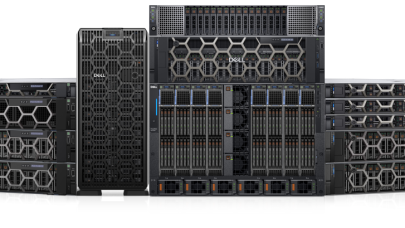
Intel Hopes to Stop Server Beating from AMD Next Year
March 13, 2023
After getting bruised in servers by AMD, Intel hopes to stop the bleeding in the server market with next year's chip offerings. The difference-making products will be Sierra Forest and Granite Rapids, which are due out in 2024, said Dave Zinsner, chief financial officer at Intel, last week at the Morgan Stanley Technology, Media and Telecom conference. Read more…

Dell Brings GPUs from Intel and Nvidia to New Servers
January 17, 2023
Dell's enterprise computing playbook has diversified in the last year, with new additions like quantum computing and high-performance computing-as-a-service to Read more…

AI Is Boosting Server Sales in China
February 6, 2020
Emerging AI workloads are propelling the booming Chinese server market, particularly those hosting programmable co-processors capable of supporting graphics chips used for parallel processing of machine learning tasks. The chief benefactor has been China’s server leader, Inspur. According to datacenter... Read more…

HPC on Pace for 5-Year 6.8% CAGR; Guess Which Hyperscaler Spent $10B on IT Last Year?
June 20, 2019
In the neck-and-neck horse race for HPC server market share, HPE has hung on to a slim, shrinking lead over Dell EMC – but if server and storage market shares Read more…

Nvidia Expands Server Play with New Designs
May 31, 2018
Nvidia’s updated server platform is intended as a “building block," in the reference design sense, to support AI training and inference along with HPC workloads such as simulations. The GPU vendor introduced its latest server platform dubbed HGX-2 on Wednesday during a company roadshow in Taipei, Taiwan. Read more…

IDC Server Report: China Surges; IBM Power Strengthens; ARM Stumbles
March 11, 2016
Led by strong growth in China, the worldwide server market grew 5.2 percent to $15.3 billion in the fourth quarter of 2015, reported market watcher IDC this wee Read more…

HPC ROI: Invest a Dollar to Make $500-plus Reports IDC
November 18, 2015
Perhaps the most eye-popping numbers in IDC’s HPC market report presented yesterday at its annual SC15 breakfast were ROI figures IDC has been developing as p Read more…

NNSA Taps Penguin Computing for 7-9 Petaflops ‘Open’ HPC Cluster
October 21, 2015
Per a newly-inked contract with Penguin Computing, the Department of Energy’s National Nuclear Security Administration (NNSA) is set to receive its third join Read more…

- Click Here for More Headlines

Whitepaper
Why IT Must Have an Influential Role in Strategic Decisions About Sustainability
In this era, expansion in digital infrastructure capacity is inevitable. Parallel to this, climate change consciousness is also rising, making sustainability a mandatory part of the organization’s functioning. As computing workloads such as AI and HPC continue to surge, so does the energy consumption, posing environmental woes. IT departments within organizations have a crucial role in combating this challenge. They can significantly drive sustainable practices by influencing newer technologies and process adoption that aid in mitigating the effects of climate change.
While buying more sustainable IT solutions is an option, partnering with IT solutions providers, such and Lenovo and Intel, who are committed to sustainability and aiding customers in executing sustainability strategies is likely to be more impactful.
Learn how Lenovo and Intel, through their partnership, are strongly positioned to address this need with their innovations driving energy efficiency and environmental stewardship.
Download Now
Sponsored by Lenovo
Whitepaper
How Direct Liquid Cooling Improves Data Center Energy Efficiency
Data centers are experiencing increasing power consumption, space constraints and cooling demands due to the unprecedented computing power required by today’s chips and servers. HVAC cooling systems consume approximately 40% of a data center’s electricity. These systems traditionally use air conditioning, air handling and fans to cool the data center facility and IT equipment, ultimately resulting in high energy consumption and high carbon emissions. Data centers are moving to direct liquid cooled (DLC) systems to improve cooling efficiency thus lowering their PUE, operating expenses (OPEX) and carbon footprint.
This paper describes how CoolIT Systems (CoolIT) meets the need for improved energy efficiency in data centers and includes case studies that show how CoolIT’s DLC solutions improve energy efficiency, increase rack density, lower OPEX, and enable sustainability programs. CoolIT is the global market and innovation leader in scalable DLC solutions for the world’s most demanding computing environments. CoolIT’s end-to-end solutions meet the rising demand in cooling and the rising demand for energy efficiency.
Download Now
Sponsored by CoolIT
Advanced Scale Career Development & Workforce Enhancement Center
Featured Advanced Scale Jobs:
HPCwire Resource Library
HPCwire Product Showcase
© 2024 HPCwire. All Rights Reserved. A Tabor Communications Publication
HPCwire is a registered trademark of Tabor Communications, Inc. Use of this site is governed by our Terms of Use and Privacy Policy.
Reproduction in whole or in part in any form or medium without express written permission of Tabor Communications, Inc. is prohibited.

























